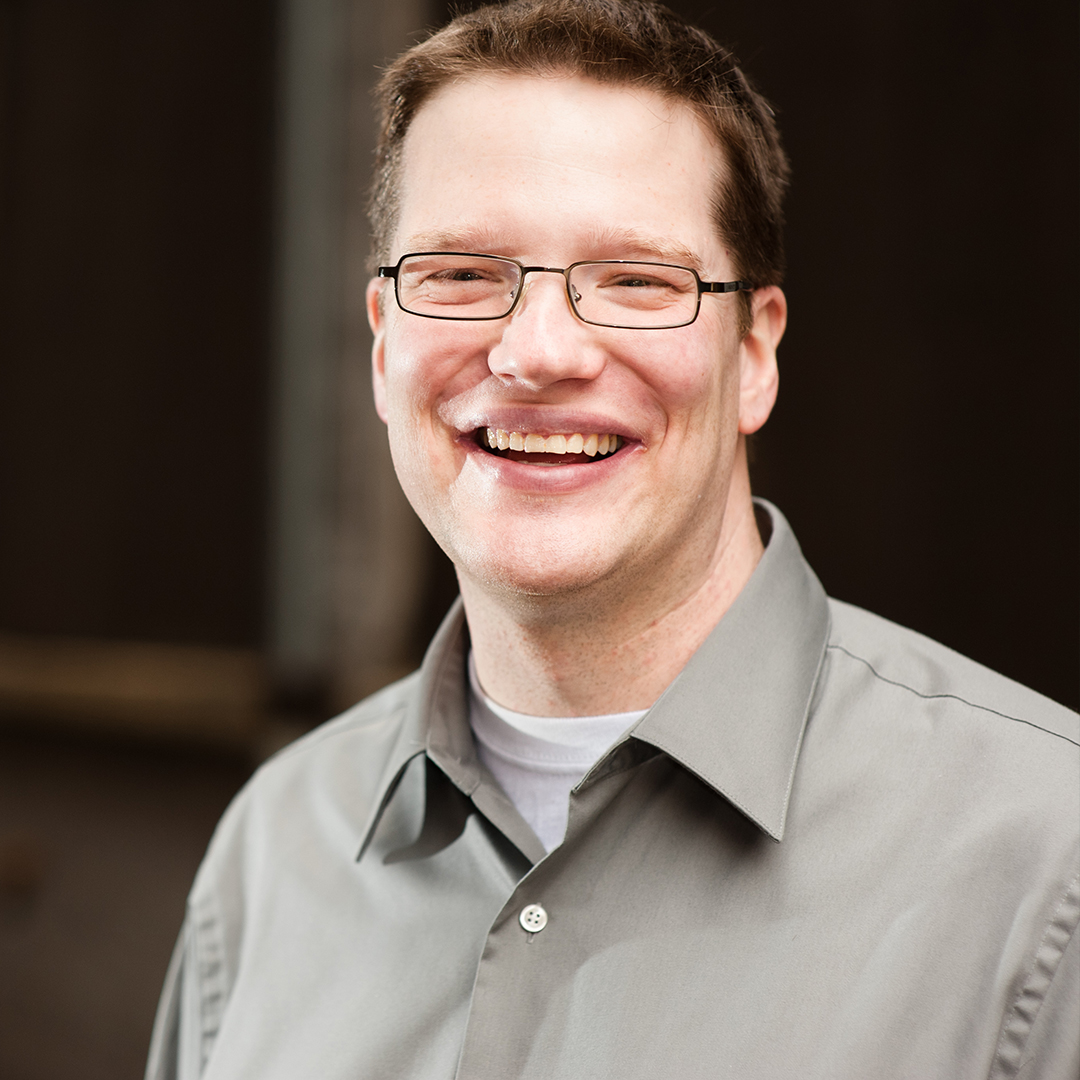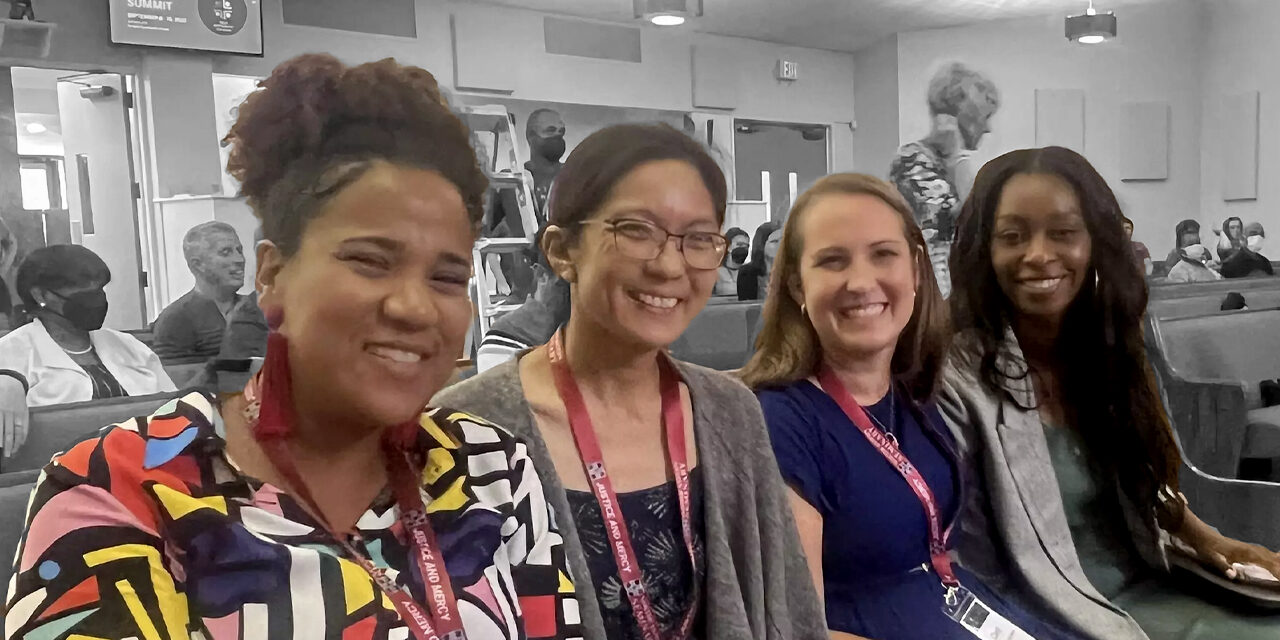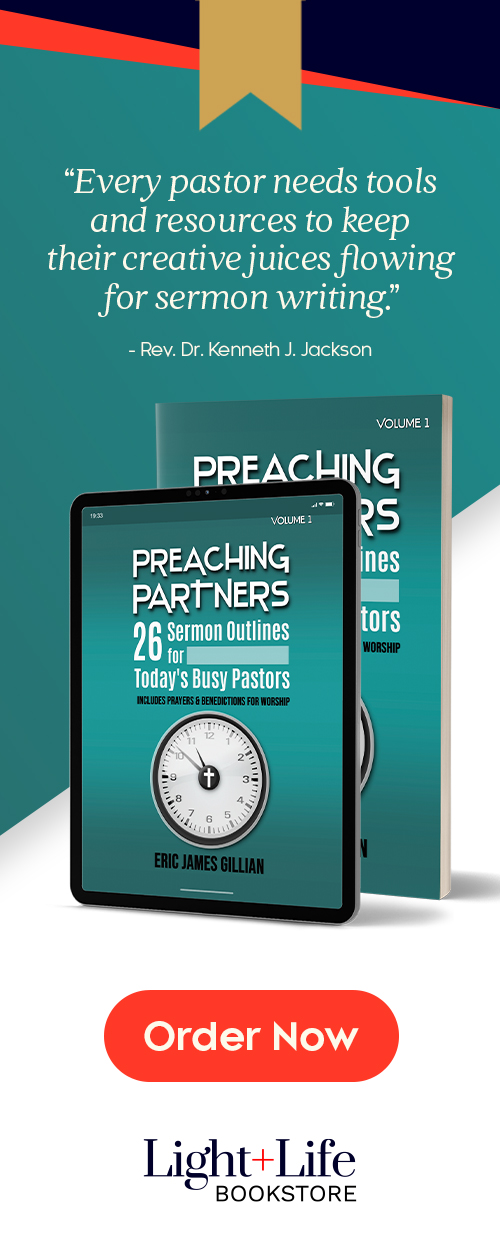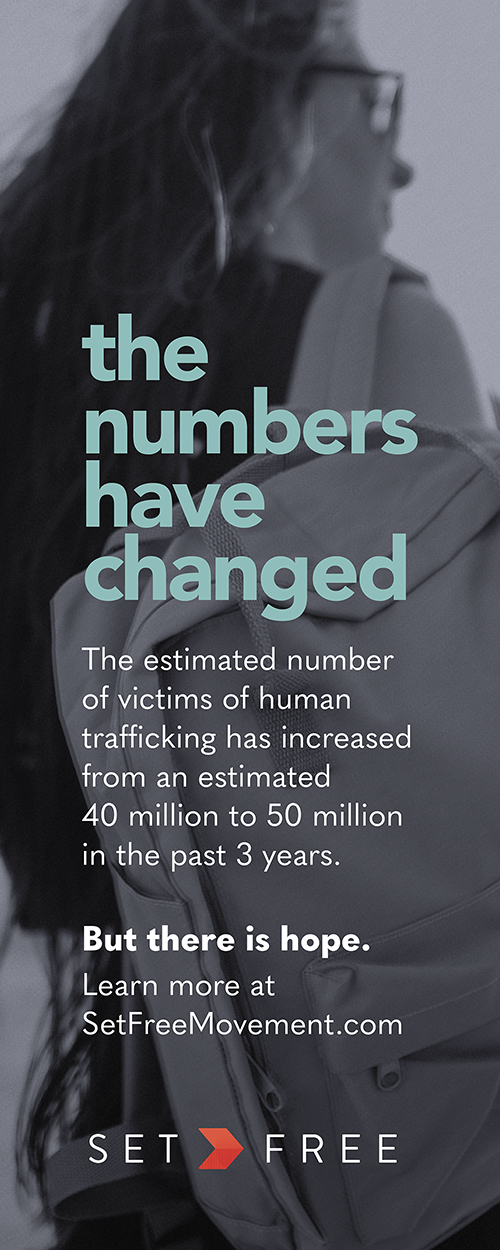
Jeff Finley
Jeff Finley is this magazine’s executive editor. He joined the Light+Life team in 2011 after a dozen years of reporting and editing for Sun-Times Media. He is a member of John Wesley Free Methodist Church where his wife, Jen, serves as the lead pastor.
By Jeff Finley
What if four pastors preached from the same passage to the same audience?
That’s what happened during the “Through a Lens” preaching panel at the 2022 Justice Network Summit. River Conference Superintendent Michael Traylor introduced the panel, which he called “my favorite part of our Justice Summit” with “four fantastic preachers” examining “a particular text, and, as the Holy Spirit leads them, they will bring a word from that text.”
Marianne Peña, co-lead pastor of Essential Life Church in Spring, Texas; Kristin Ou, associate pastor of Anaheim Free Methodist Church in Anaheim, California; Ta’Tyana Leonard, Azusa Pacific University’s associate director of chapel and pastoral care who also serves on the pastoral team at Light & Life West in Long Beach, California; and Clare Ferguson Bravo, lead pastor of Rose City Church in Pasadena, California, offered their unique perspectives on Jeremiah 4:11-12, 22-28.
_
“… each of us come to the text with different life experiences, unique passions, and many ways of seeing God at work in this world.” – Kristin Ou
_m `
In an interview after the summit, Ou said that while “there were some similarities and overlap in the things that we preached, there was also a richness in each sermon. Different aspects of the text were highlighted and brought to life in unique and beautiful ways, because each of us come to the text with different life experiences, unique passions, and many ways of seeing God at work in this world.”
Peña found it “beautiful to see how four different people can read the same Word of God yet have four distinct perspectives on it — each powerful and with their own merit. Even as one of the speakers, I learned so much from the other preachers. They opened my eyes to things I had never considered or thought of. This type of experience reinforces the vastness of God.” She noted that “hearing from different people’s reflection on Scripture is a great picture of the gospel. Jesus called His church to be a priesthood of believers. “
Peña said she initially “was nervous about simply being chosen. My mind wanted to get caught up on what the others would say or how it would contradict one another, but then I remembered that God is big enough to use each of us uniquely while at the same time He is big enough to weave the messages together. My approach was to simply let the Holy Spirit lead me in what He wanted to say. I knew that it would be contextual. It would fit into my personal experiences and preferences.”
Lenoard said the selected text “was very challenging. I prayed and prayed some more.” At the summit, she found it “amazing to hear three other perspectives on the same passage. All of the ladies took a different angle and approach to pull out the meaning of the passage. Together, I believe we are able to give a fuller picture and understanding of God’s Word. One example, one testimony, or one key phrase from each message spoke to our souls in unique ways. It was a great example of how powerful team preaching can be.”
From Chaos to Justice
In her message, Peña said the Bible begins with the Creation, which is contrasted with the disorder of chaos. Jeremiah lets the Israelites know that chaos is coming again.
_
“We seek justice because just is who God is.” – Marianne Peña
_
“This is what happens when you’re out of order and out of harmony with God,” Peña said. “Sometimes it’s hard for us to imagine that because you walk outside and you see the trees, and the sun comes up and the sun goes down. But if we get into this text, we realize that the chaos he’s describing is this chaos that looks like idolatry. It is a chaos that looks like injustice, that looks like unrighteousness, like disobedience, and like self-servedness.”
The people are called “fools” and “senseless children” (v.22).
“I doubt that the Israelites thought of themselves as stupid and foolish children. In fact, I’m almost positive that they probably saw themselves as sophisticated and wise,” Peña said. In contrast with Creation, “now God’s judgment was bringing chaos out of order, darkness out of the light, and emptiness out of fullness.”
Jeremiah’s message wasn’t for people who don’t follow God. It was for God’s people.
“God is demanding righteousness from believers, not from unbelievers. He’s precisely asking this from those who call themselves His own,” she said. “For us to do right and for us to live justly and for us to do right by others, we don’t need a special name. We don’t need a special holiday or an occasion or even a conference, believe it or not. We seek justice because just is who God is.”
A lack of justice leads to a loss of identity through putting ourselves before others.
“To lose one’s identity is to go against God’s established creation, so we need to be careful, lest we find ourselves in a world that is completely devoid of light, formless and empty, full of darkness, unable to make sense of which way is up, unable to discern between what’s right and what’s wrong,” Peña said. Thankfully, Jesus “came to reestablish Creation, purpose, identity, hope, justice and righteousness, so although judgment is always impending, mercy shouts even louder.”
The Way of Love and Justice
Ou said she has recently reflected “on my own Japanese American culture” that places “such a high value on harmony. Oftentimes, we avoid seeing the hard things, and so we do not address the difficult, the messy, even the unhealthy, in an attempt to preserve group harmony.”
_
“I pray that each and every one of us would have the courage and the will to choose to walk in the way of love and justice of our God.” – Kristin Ou
_
While people may be reluctant to address each other honestly, God doesn’t have an issue with uncomfortable confrontations.
“In these few verses, God talks to Jeremiah about the judgment that is to come, and that judgment is coming,” said Ou, who added that God revealed to Jeremiah that the prophet’s “people, God’s own people, are fools. People who are fools are those whose actions lead to destruction; the choices that they make lead to ruin.”
Ou also noted that Jeremiah “echoes the same language that we see in Genesis 1 to describe Creation, but in Genesis 1, those words bring life and beauty and order spoken by God. Here in Jeremiah 4, they bring destruction. Jeremiah looks at the earth, and he sees that it is formless and empty.”
God “doesn’t beat around the bush. He doesn’t mince words. When God sees the situation of what is going on among His people, who no longer know Him and who are in fact moving away in the opposite direction, He speaks these words, and in doing so, He’s giving the people an opportunity to hear and maybe, just maybe, they might respond,” Ou said. “Today we are not the people of Israel, but just like they did, we have a choice to hear and to respond to these words. To seek God, to know Him, to walk in His ways and to choose to do what is right in this world.”
Ou said that when she looks “out into the broken world, I get a little bit overwhelmed. It all just feels a little bit too heavy. I see unjust and oppressive structures out there, but what is also heavy and overwhelming to me is that my life — the way that I live — is tangled up in those systems of oppression and injustice.”
She pointed to our consumeristic culture and being “constantly surrounded by ads to buy and to keep buying with little thought at the cost of these products, how they were made, or how they were transported to our doorsteps. I think about the food that we eat, which is grown by people who worked incredibly hard and are paid very little.”
While personal effort to counteract these injustices may seem insignificant, Ou noted that “at the very least it shapes us to live in a way that is more informed by the wisdom and the love of our God. … Let’s seek His ways, His wisdom and His heart, and as we do, I pray that each and every one of us would have the courage and the will to choose to walk in the way of love and justice of our God.”
Gracious Wind
The week of the summit, Leonard’s parents both had medical emergencies. During her message, she shared how her hardworking father’s employer limited his hours to keep him from getting health insurance, which made him uninsurable after he was diagnosed 12 years earlier with prostate cancer at a free clinic. After surgery, he had a medical bill of more than $100,000.
_
“When we try to be God or we put our own comfort before what God has for us, it is chaos.” – Ta’Tyana Leonard
_
“This week I was brought back to that place of the frustration of our broken systems and even how we, brothers and sisters in Christ, fight to keep those broken systems because it will disrupt our comfort,” she said. “When Jeremiah initially talks about this, like gracious wind, we initially aren’t able to decipher or separate the grain from the chaff, and so now he has to bring this violent, destroying wind.”
Her father’s experience has become “a prophetic voice in story that actually causes us to look at the things that we do not want to see.”
She pointed to Jeremiah’s message: “Look, because we ignored the gracious wind, now we have to see the reality of our destruction and broken systems that we’ve created when we were led astray by the gods of Baal — by the idols of political power, wealth, comfort and apathy.”
Like the other pastors, she noted the passage portrays “a reversal of the Creation account. It shows what our world looks like when we try to be God. When we try to be God, we reverse what God has intended. When we try to be God or we put our own comfort before what God has for us, it is chaos.”
She expressed gratitude for the challenging passage in Jeremiah because of its application to the modern church.
“My encouragement is to take in this gracious wind — the prophetic voices that are causing us to look at the things we do not want to look at, and allow the grief to be godly grief that causes us to repent, restore, and renew our relationships with God and with others,” Leonard said.
Weather Warning
Ferguson Bravo shared about her 2004 move across the state of Texas to attend Texas Tech University in Lubbock.
“The one constant weather nuisance was wind. All of the college marketing materials that I got about Texas Tech failed to warn me that I was moving to the third windiest city in the United States,” she said.
Comparing the situation to a tornado warning, she noted the strong wind in Jeremiah 4 “coming as a judgment for their disobedience, and yet they do not have the eyes to see what is on the horizon. Through the prophet Jeremiah, God is trying to shock his people out of their stupor.”
Jeremiah’s Creation references are not unusual in the Bible.
“Throughout Scripture, the fertility, the habitability of land — specifically the land of Israel — is an index of the state of our relationship with God. We often overlook this barometer, but it’s woven throughout the pages of Scripture,” Ferguson Bravo. “We remember that humanity’s relationship began in a garden, and the byproduct of our broken relationship with God brought a curse to the land.”
_
“Maybe our emphasis on life after death has left us callous to the care of the world and the here and now.” – Clare Ferguson Bravo
_
She reflected on the devastating combination of bad theology, policy and overuse of land that led to the Dust Bowl of the 1930s, and she considered the world’s current state.
“Has our apathy to injustice formed us into people who are so apathetic that we cannot see when God is speaking to us — that we cannot hear the voice of God when He is speaking? Can we muster the spiritual fervor Israel is lacking in Jeremiah? Can we lament the tragedies that we see before our eyes? I wonder if these environmental pains that we feel reveal something about a theology that has led us astray?” she asked. “Maybe our emphasis on life after death has left us callous to the care of the world and the here and now. Do we care about God’s shalom for the next generation as much as we pray for the souls in this one?”

Jeff Finley
Jeff Finley is this magazine’s executive editor. He joined the Light+Life team in 2011 after a dozen years of reporting and editing for Sun-Times Media. He is a member of John Wesley Free Methodist Church where his wife, Jen, serves as the lead pastor.









